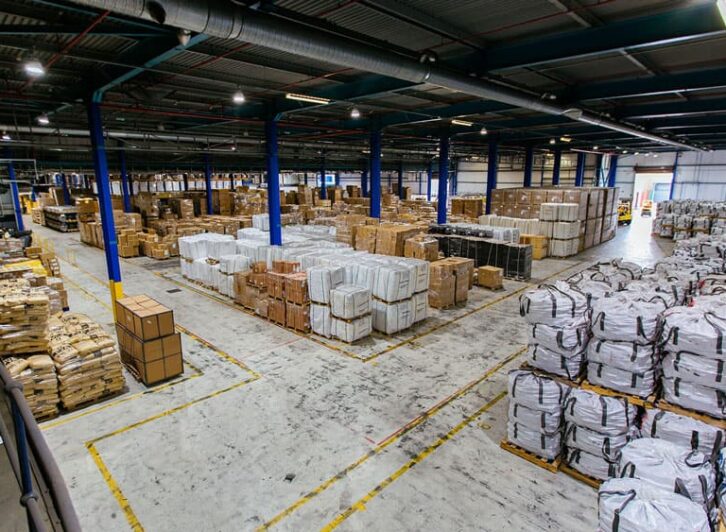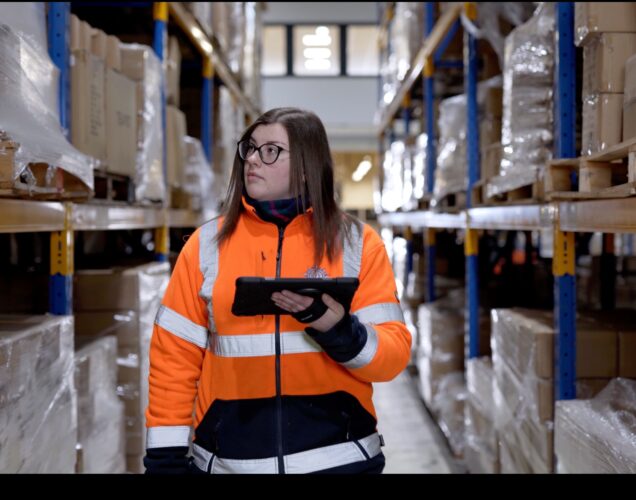What is a bonded warehouse?
A bonded warehouse is a secure storage facility where businesses can store imported goods before they are processed by customs. Also known as a customs warehouse, it allows businesses to defer paying taxes and duties until the goods are removed for use or sale.
This is because the goods remain under customs control and are not considered part of the local market until their final destination is determined.
As such, businesses should be aware of the specific controls, legislations and fees bonded goods will be subject to in the country where the customs warehouse is located. Otherwise, they could find themselves with unexpected bills or paperwork.
Types of bonded warehousing
It’s also important to understand the differences between two main types of HMRC-approved bonded storage:
- ‘Wet’ bonded warehouses are used to store goods that are subject to excise duty, such as alcohol, tobacco products, and fuels
- ‘Dry’ warehouses are for goods that aren’t subject to excise duty, but still have VAT and customs duties applicable to them, this could be consumer products, raw materials, or food
Any facility operated by a third party is called a public warehouse and may contain goods from a range of different businesses. Alternatively, companies may have their own exclusive facilities, these are called private customs warehouses. Each type of warehouse has different operational licenses, so businesses need to choose one that’s approved to handle the required goods.
What is the difference between a bonded warehouse and a normal warehouse?
A key difference is tax handling. In a bonded warehouse, taxes and duties are deferred until the goods are removed. In contrast, a non-bonded (regular) warehouse may offer VAT advantages by allowing buyers and sellers to avoid paying VAT at the time of purchase or sale.
How does bonded warehousing work?
For a business to bring goods into the UK and store them in a bonded warehouse, it needs to:
- Declare the goods through a full import declaration or via a simplified declaration (this can be done through the official procedure or by making an entry in the declarant’s records). If declaring via a customs agent, a business must provide them with clear written instructions
- Send the goods to the warehouse named on a goods declaration within five days of customs clearance
- Supply the warehouse operator with full details of the goods declaration. Checking if an operator has appropriate licensing for storing the declared goods is essential
- Arrange payment of the goods storage fees to the warehouse operator, this will vary depending on the length of storage and specific goods requirements
The goods will then be kept in the bonded facility until they’re put into free circulation, re-exported, used for manufacture or moved to another customs warehouse.
What are bonded goods?
Bonded goods are items imported by businesses that are stored in a customs warehouse pending clearance and the payment of any owed duties, taxes and other customs charges. Once the payment is made through an out-of-bond removal declaration, the goods are considered to be in ‘free circulation’, meaning they can be moved freely within the country of import. Alternatively, bonded goods can be re-exported without incurring import duties or taxes.
Do you have to pay VAT on sales from bonded warehouse goods?
You only have to pay VAT on bonded goods when they’re put into free circulation, known as import VAT. However, it’s worth checking whether your goods qualify for import VAT relief. Usually these are goods that have been imported for testing, analysis or examination purposes. This is also the case for some duties.
If your goods are sold directly from a customs warehouse as part of a retail transaction (typically this is done online), then you will be charged supply VAT.
How to move goods from a bonded warehouse
To move goods from a bonded warehouse into free circulation, businesses need to:
- Notify the warehouse operator that you’re planning to remove your goods
- File a customs declaration and pay any outstanding VAT, customs and excise duties
- Gain a warrant clearance to remove your goods
- Arrange the collection of your items
VAT, customs and excise duties won’t need to be paid if goods are moved to another bonded warehouse or are exported. The majority of imported goods may be stored in a bonded warehouse in the UK for as long as you wish, although products covered by the Common Agricultural Policy (CAP), such as oils and fats, meat and sugar, are subject to specific arrangements.
What are the benefits of bonded warehousing?
Bonded warehouses offer huge benefits to UK importers, businesses and their supply chains, including better cash flow, lower lead times and faster supply to customers.
Improved cash flow
Businesses only pay duties and taxes on bonded goods when they are put into free circulation. These deferred payments give businesses much-needed breathing space to market the product or carry out additional pre-sale activity. It also provides a period of time in which goods may be sorted, repackaged or processed (within the usual forms of handling) prior to being distributed, during which no duty or tax need be paid.
Moreover, if a business directly exports its goods to another country, no duties need to be paid at all. This leads to an estimated tax saving of around 25% to 30%.
Long-term storage solution
With the exception of products covered by the CAP, goods may be stored in UK bonded warehouses indefinitely. If work needs to be done to meet import requirements (for example, import licensing requirements), or goods are restricted, they may be stored until these restrictions are met.
Anticipation of supply and demand
You know that customers will need your goods – you’re just not sure exactly when. This is where a customs bonded warehouse can really help. Goods can be ordered ahead of seasonal peaks in demand, stored and put into free circulation when needed. This allows you to be agile and responsive, even when faced with unpredictable sales.
Maintain the safety, quality and compliance of goods
Warehouse facilities are equipped to store particular kinds of products for as long as necessary while ensuring their quality. They are also highly regulated and undergo regular inspection by HMRC. As such, you can be sure that your goods are kept compliantly. Moreover, the warehouse is required to have robust security measures (such as CCTV) and to fully document your goods, giving businesses extra peace of mind.
Reduce lead times and carbon
The majority of bonded warehouses are located close to major ports or airports, allowing companies to store their goods at the port of entry until they are ready for distribution. This creates cost savings across the entire supply chain as it reduces lead times and the potential for damage. It also cuts the cost of transport and the amount of carbon emissions produced.
Where can I find a bonded warehouse near Felixstowe?
HFS provides an end-to-end logistics and bespoke bonded warehousing service from Ipswich, Felixstowe and London Heathrow Airport, with an additional warehouse facility close to the Port of Liverpool.
Our specialist warehousing team is able to handle loading and unloading, cross docking and order fulfillment, as well as pallet and carton distribution. Our warehouses are monitored 24/7, giving customers total peace of mind.
Moreover, we have in-house customs clearance experts to guide you through the latest raft of Governmental legislation and to help you secure the best rates for your shipments.
We pride ourselves on our industry knowledge and ability to understand every customer’s needs. We can store most things – so if you’re looking for a bonded warehouse, or a complete warehouse and logistics solution, please get in touch.






